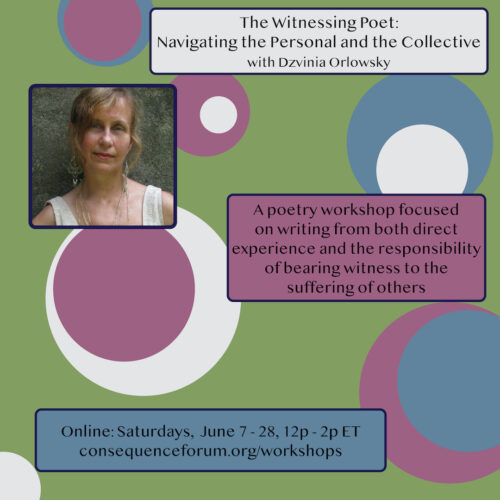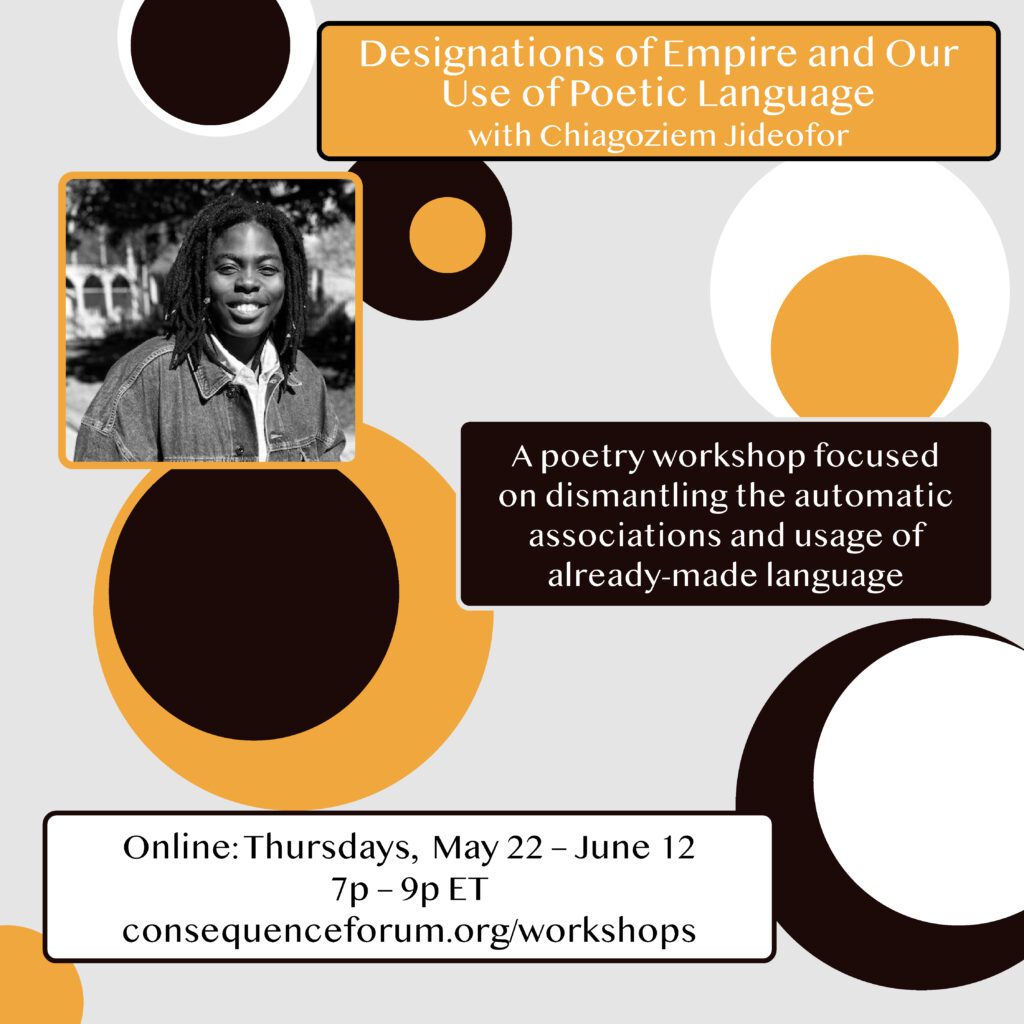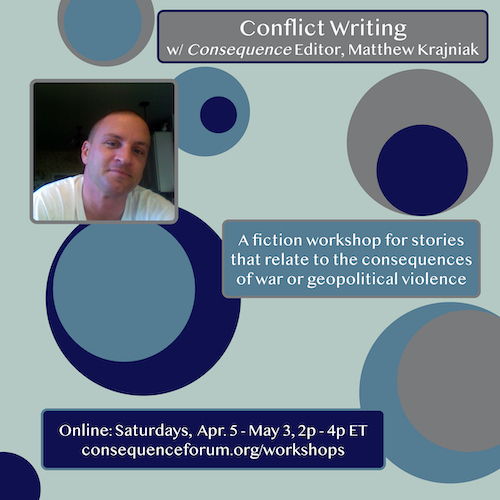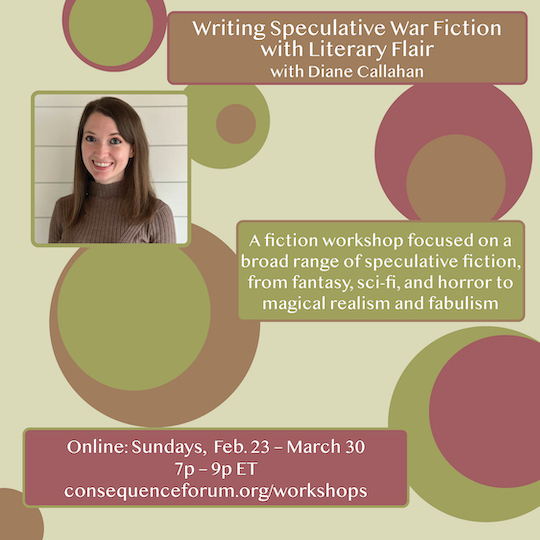Writing Workshops
The goal of our writing workshops is to help individuals grow either creatively or professionally. We do this through traditional creative writing workshops and through professional writing workshops that are focused on topics like publishing, grant writing, and business plan development. Our primary audiences are Veterans and victims of and witnesses to war and geopolitical violence—individuals whose experiences may not have afforded them the opportunity to yet learn these skills. However, we also offer plenty of classes to general audiences, though the class topics gravitate toward our themes.
Upcoming Workshops
The Witnessing Poet: Navigating the Personal and the Collective
What: Poetry that bears witness to personal and historical trauma, war, and grief, demands both immediacy—the ability to bring a reader directly into a moment—and urgency—the necessity of speaking difficult truths. But how do poets balance raw experience with reflection? William Wordsworth described poetry as emotion recollected in tranquility, but for those writing about war, grief, and historical trauma, this luxury is often unavailable.
In this workshop, we will consider the difference between personal testimony and inherited witnessing, as well as strategies for evoking lived experience versus reflecting on history. We will examine how poets navigate the personal and the collective, writing from both direct experience and the responsibility of bearing witness to others’ suffering. Our primary focus will be engaging with and strengthening participants’ own poetry, exploring how poetic techniques—such as syntax, pacing, omission, and sensory detail—create urgency, immediacy, and authenticity.
- Session 1: Witnessing and the Poetic Lens
- Session 2: Crafting Urgency and Immediacy
- Session 3: Navigating the Personal and the Collective
- Session 4: Refining and Deepening the Work
After this class, participants will be able to point to a deeper understanding of how to balance immediacy and urgency in their poetry, particularly when writing about personal and collective trauma. They will leave with practical techniques for crafting authenticity—using syntax, pacing, omission, and sensory detail to heighten emotional impact—while also recognizing the power of reflection and restraint. Through readings, discussion, and writing prompts, they will have explored different modes of witnessing, from personal testimony to inherited history, and gained strategies for navigating these complexities in their own work. Most importantly, they will walk away with strengthened drafts and a refined awareness of how form, voice, and perspective shape the weight and resonance of a poem.
Who: Dzvinia Orlowsky is a Pushcart Prize poet, award-winning translator, and a founding editor of Four Way Books. She has authored seven poetry collections with Carnegie Mellon University Press, including Bad Harvest, a 2019 Massachusetts Book Awards ‘Must Read’ in Poetry, and her most recent, Those Absences Now Closest, which was named to Brilliant Books’s Most Brilliant Books of 2024 list. Ali Kinsella and Dzvinia’s co-translations from the Ukrainian of Natalka Bilotserkivets’s Eccentric Days of Hope & Sorrow was a finalist for the 2022 Griffin International Poetry Prize and winner of the 2020-2021 AAUS Prize for Translation. They received a 2024 NEA Translation Fellowship for their translation of Halyna Kruk’s Lost in Living (Lost Horse Press, 2024), a finalist for the 2025 PEN America Literary Award.
When & Where: Online: Saturdays, June 7 – 28 from 12 – 2p ET
Class Limit: 12
Cost: $105
Translating Love & Anger in Resistance Poetry
What: One of the biggest challenges in the world of translation is conveying emotions accurately. Unlike a poetry reading, where the emotion of the reader or the poet can be readily grasped, a translated work can often lack that accessibility to sentiment.
Focusing on resistance poetry, these two interrelated classes will have writers read a variety of emotionally-charged translations and analyze and discuss how the pieces successfully (or unsuccessfully) translated their respective emotional components. Writers will also engage in class exercises to apply these concepts with the ultimate goal being to develop or further embed these and other translation skills.
Though this course has a specific focus it is very much designed for any writer, whether you are a seasoned translator or someone who is simply interested in the genre and wants to learn more.
Who: Dr. Fathima M. is an academic based in India. She teaches various graduate courses, including Translation Studies and World Literature. She was a Fulbright scholar at the University of Texas at Austin, 2017 -18. She also served as an Assistant Translations Editor for Consequence, 2024-25.
When & Where: Online: Saturdays, June 28 and July 5, 11:30a – 1:30p ET
Class Limit: 10
Cost: $40 for one class / $75 for both
Publish Your Personal Essay in a Newspaper
What: Local newspapers don’t only publish news articles written by their reporters. They also often accept short reflections and publish them as guest columns, usually on their opinion pages. These reflections have the power of any personal essay as they relate a lived experience to people who maybe know nothing about the respective event, culture, or people involved. What’s great is that you don’t have to be a published author to submit these pieces (though they can too), as newspapers often try to publish a range of voices, especially if their experiences have a contemporary relevance. As an example of such a guest column, here is a piece I published in the Bangor Daily News in Maine.
In this class, you’ll learn 1) how to pen a five-hundred- to seven-hundred-word first-person essay that will stand up to an editor’s fact checking, and 2) when and where to submit it to have the best chance of seeing it published. To do this you’ll first identify an experience you’ve had that’s related to a conflict. This experience can be from your perspective as a combatant, a relative of a combatant, a witness, a victim, or any other connection to armed conflict. Experiences that have contemporary relevance are valuable but not required. Below is a list of conflicted-related holidays/days of recognition. Participants will then workshop their pieces with one another to get them ready for an audience.
By the end of the class, you will have crafted a powerful and succinct personal story that you can submit to a newspaper or other outlet if you wish.
Upcoming holidays/days of recognition:
Jul 27—Korean War Veteran Recognition Day
Aug 4—Coast Guard Birthday
Aug 7—Purple Heart Day
Sep 11—Patriot Day
Sep 18—Air Force Birthday
Oct 13—Navy Birthday
Nov 10—Marine Corps Birthday
Nov 11—Veterans Day
Dec 7—Pearl Harbor Remembrance Day
Dec 13—National Guard Birthday
Who: Erin Rhoda has worked at newspapers in Maine for sixteen years. Most recently she was the investigative editor at the Bangor Daily News where her team’s work propelled new state laws. She has won many awards. In 2018 her peers named her one of Maine’s ten most trusted journalists. She graduated summa cum laude from Colby College with a major in English and later won the national George J. Mitchell Scholarship to earn her master’s in creative writing from Trinity College in Ireland.
When & Where: Online: Mondays, July 7, 14, & 21 from 7 – 8:30p ET
Class Limit: 12
Cost: $85
Previous Workshops
Designations of Empire and Our Use of Poetic Language
What: Poetry is profound because it is emotive and deeply personal. But how do we express the personal and the affective in the face of linguistic habituation, unified literariness, and linguistic conformity? This writing workshop will focus on dismantling and discouraging automatic associations, mental slips, and every usage of already-made language. The incorporated writing exercises will encourage us to experiment with and borrow from subversive language approaches that free language from its riveted and imperial past. We will examine the designation of “poetic language,” how much of our agency and legitimacy is sacrificed in pursuing this poetic language, and what language we can invent to share personal truths and revelations.
By the end of this class, participants will be exposed to constructive and edifying approaches to language use and meaning-making.
Reference books:
Mad Woman by Shara McCallum
Togetherness by Wo Chan
Ban en Banlieue by Bhanu Kapil
Conflict Writing
Who: Consequence Executive Editor, Matthew Krajniak, will host a fiction workshop for writers who are at any stage of developing a story that relates to the human consequences of war or geopolitical violence. These stories can be of any length, though self-contained pieces typically work best. If you are unsure if your story fits this workshop, please email Matthew at consequenceforum@gmail.com. This class is not exclusively for veterans, combatants, and victims, but rather is open to everyone as long as your story relates to these consequences.
Why: Writing fiction related to the consequences of war and geopolitical conflict is difficult for any number of reasons, from the lack of verisimilitude to shaping intense personal experiences into an effective narrative. We’ll cover any number of aspects of craft, but learning how to handle these challenging themes will be the focus of this workshop.
How: The first week we’ll concentrate on generative exercises, discussing a short story and a craft essay, talk about the publishing world, and in general get to know each other a little better. For the other five weeks, we’ll continue to do this, but will also reserve the last hour and a half of class for two workshops.
Writing Speculative War Fiction with Literary Flair
What: War is a human constant, so it’s no surprise that conflict and its consequences feature across all genres of fiction—even the fantastical and futuristic. This workshop will focus on a broad range of speculative fiction, from fantasy, sci-fi, and horror to magical realism and fabulism, that specifically explores themes of geopolitical violence. At Consequence, we define geopolitical violence broadly to encompass displacement, systemic racism, state-sponsored killings, and colonization. Through the lens of the speculative, these types of short stories depict the familiar in an unfamiliar light, enabling readers to uncover new facets of crucial, real-world topics.
Here, you’ll find a crash course in writing short speculative fiction centered on victims and witnesses to war and political conflict. Participants will read and discuss 8,000–15,000 words per week (typically two or three pieces—short stories, novel excerpts, and/or craft essays) related to a variety of subjects: world-building, character details, style, and endings. Each session will include a generative writing exercise component.
Writers will receive individualized feedback from one of their peers and the instructor on a short story or novel excerpt. In addition, they will have the opportunity to vent about their writing obstacles during a Talk Therapy for Writers session, where each writer talks their way through a problem while the group asks them questions designed to get the gears turning.





